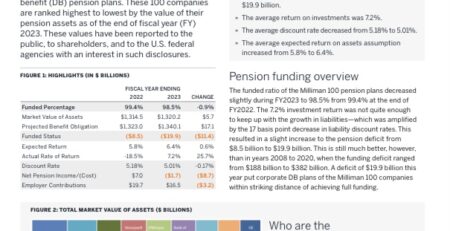Private Markets, Infrastructure and Venture Capital in the Post-COVID Era: The Pension Perspective
By David Weeks, M. Nicolas J. Firzli
This second of a series of seven papers co-authored by M. Nicolas J. Firzli and David Weeks looks at the notions of private markets – PE, VC, private debt and infrastructure – and the “quest for yields” in a low interest rates environment, which where discussed at two recent global conferences organised by the G7 Pensions Summit (G7 P7) and the Singapore Economic Forum (SEF).
ESG, impact investing, renewable energy and the notion of green growth are also discussed by the co-authors and other experts, including the Hon. Nick Sherry, fmr. AUS minister of Superannuation & Corporate Law, Nick Silver, chairman, Climate Bonds Initiative (CBI), Michael Dennis, Head, APAC, Alternatives & Cap. Markets, BlackRock, Dr Guan Seng Khoo, Singapore Management University (SMU) and Ingrid Edmund, Columbia Threadneedle Investments (CTI)
The notion of financial long-term-ism is considered from the perspective of institutional asset owners, notably in the US, Britain and the European Union (EU), where “pension fund regulation and the structure of the industry [often] puts a premium on liquidity and causes short-termism, at the expense of long-term investment and patient capital.”
Australia has seen much interest in privatisation of public functions/assets. This has increased opportunities for private investment in infrastructure. It has, however, raised political discussion about the correct pricing of “monopoly assets”, such as large regional airports and water utilities.
The authors also look at some of the recent developments in Canada, China, India and various ASEAN jurisdictions, including Singapore and assess the role played by the city-state in a complex period: “the COVID crisis has accelerated the mutually reinforcing effects of the Age of Empowerment (ESG, Equity and Entrepreneurship/the Venture Capitalist Ethos), the Age of Geoeconomics (intensifying Sino-American coopetition) and Datafied World Economy (Digitalization, Ai, Cybernetics), and Singapore is positioned precisely at the crossroads where these three powerful currents meet.”
Some of the financial and geo-economic aspects of the “Post Brexit” era are also analysed. The authors note that HM Government has invited four key maritime powers to join the 47th G7 summit held in Carbis Bay, Cornwall later in the year: Australia, South Korea, India and South Africa, thus “bringing the blue economy to the fore of the global policy agenda”.
Source: SSRN
301 views










